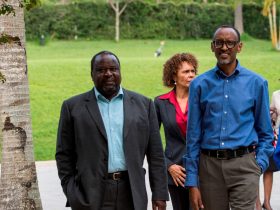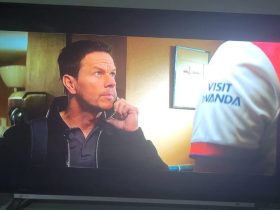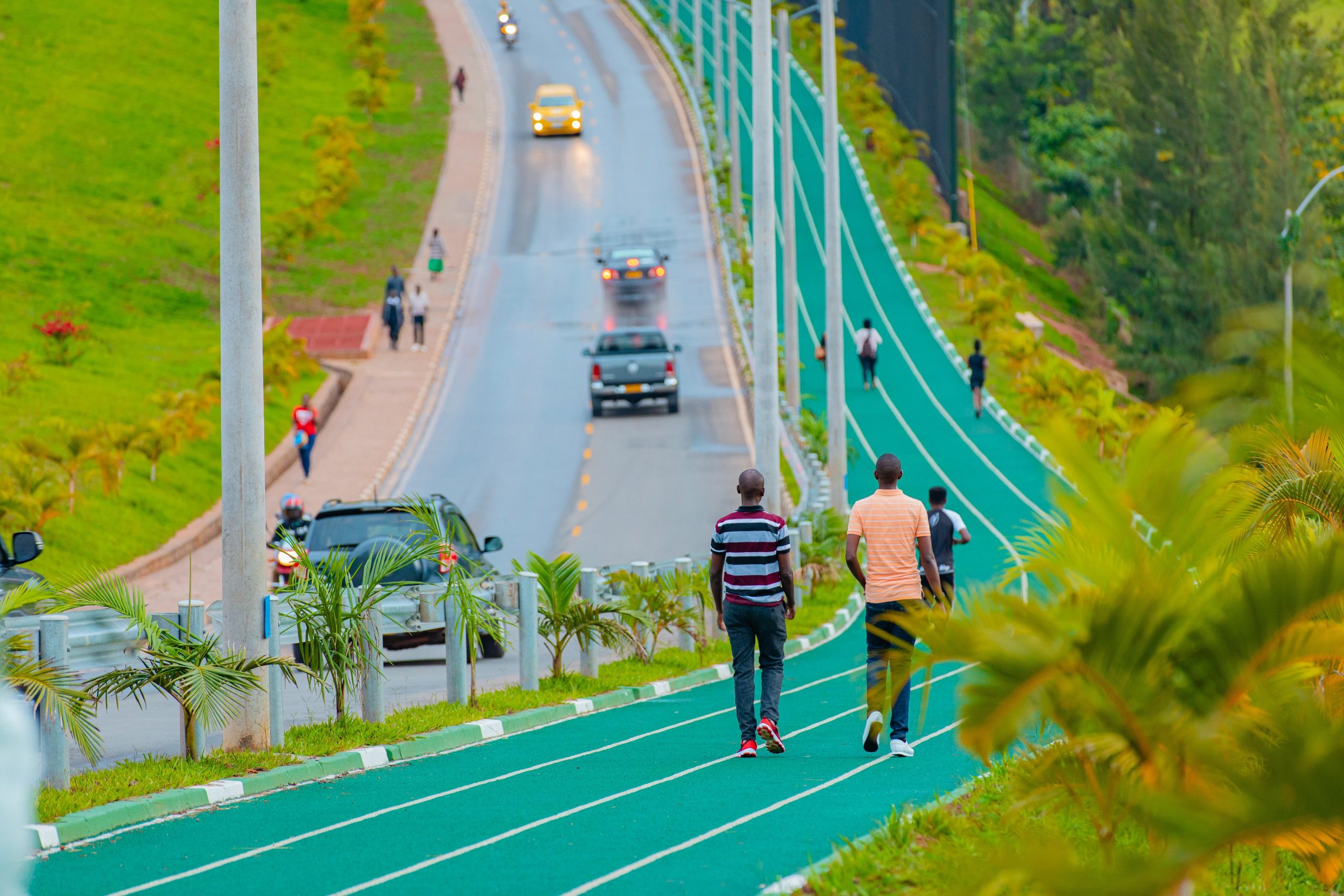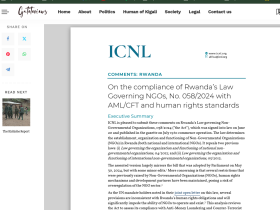 Towards the end of 2012 as I lived in South Africa, I receive a call from my Danish friend Andreas Christensen in Kigali. He is outraged by a report he read on the website of the Danish Institute for International Studies (DIIS). As a good Danish citizen he frequently consults DIIS’s space to be informed about world politics, and know where to go and what to think. Except this time he has stumbled on to a report that is telling a story that has nothing to do with his four and a half years’ Rwandan experience. It was published by one Simon Turner, an English ‘Expert on our region’.
Towards the end of 2012 as I lived in South Africa, I receive a call from my Danish friend Andreas Christensen in Kigali. He is outraged by a report he read on the website of the Danish Institute for International Studies (DIIS). As a good Danish citizen he frequently consults DIIS’s space to be informed about world politics, and know where to go and what to think. Except this time he has stumbled on to a report that is telling a story that has nothing to do with his four and a half years’ Rwandan experience. It was published by one Simon Turner, an English ‘Expert on our region’.
In a nutshell: Simon Turner says unlike in Burundi, in Rwanda the ‘Victors – [current regime] lacks popular legitimacy’ and predicts that Rwanda is facing an imminent implosion while Burundi has found the right model for lasting peace…
Andreas tells me we should write a rebuttal, and sends me the link to the report: http://www.econstor.eu/bitstream/10419/97064/1/78031865X.pdf
I read it and I understand his frustration: The report is a compendium of all the lies and prejudices, frequently written on Rwanda by Genocide deniers and those who hate our president Paul Kagame.
Here is the Summary taken from the Danish Institute for International Studies: http://en.diis.dk/publikationer/are-strong-states-and-economic-development-the-solution-to-ending-conflicts-in-africa ‘The report argues that Rwanda appears to be ahead of Burundi in terms of economic growth, political stability and state building. Likewise, it appears that national unity has replaced ethnic tensions. On closer scrutiny, however, these achievements may only be temporary. In the long term, Rwanda risks renewed violence because of a lack of social justice and popular legitimacy of the state. Burundi, on the other hand, appears to be achieving meager economic growth and is experiencing political instability. However, the report argues that the long and complex path that Burundi has chosen, may prove to be more durable in the long run.’
We wrote the rebuttal, sent it to the Danish Institute for International Studies and requested them to publish it in all intellectual fairness. They never did; although Simon Turner re-tweeted its link on my blog saying, ‘it is the first time my work is used like this’. Here is the link to our rebuttal: https://gateteviews.rw/politics/rebuttle-to-a-biased-report-on-rwanda-and-burundi-by-self-appointed-african-experts/
When I move back to Rwanda in 2014, I am invited by a diplomat in Kigali to ‘discuss my work’. I notice that he has printed the entire rebuttal from my blog, studied it and marked passages in it with a highlighter. He sits me down and asks: ‘Gatete, how has your opinions about Rwanda changed since you came back…?’
Two years later, 3.8 million Rwandans sign a petition requesting the Rwandan president Paul Kagame to stay in power, when his last term in office ends; they feel he has delivered progress and stability. In Burundi on the other hand, the population conducts an up-rise, asking the president and his administration to leave; a military coup is attempted and failed. The country remains in a political turmoil to date, with more than 100 thousand people displaced, some sheltered in refugee camps in Rwanda.
In the 44-pager report, Mr. Turner portrays Rwanda as a country where the population is taken hostage by a small, illegitimate gang, and that soon rather than later the people will rise. In Burundi however, he rejoices, all is well.
In fact, what really saddens both my diplomat friend and Mr. Turner – as the latter writes; is that in Rwanda: ‘issues of ethnicity have simply been banned from public discourse’ […] by what he calls the victors’
While we found it easy to rebut his report and expose its flows. We stopped short however, of preconceiving an upcoming crisis in Burundi. We are no conflict experts; nor are we Danish institutes for world developments; we are just citizens of mankind wishing well to all societies, with the needed humility to know our limits, when it comes to defining rich and complex civilizations in six months research and a 44 pager of flowed treatises.
But Simon Turner isn’t alone on this; in fact, he was just feeding into a pervasive narrative of our region, widely held by the so-called experts; those who precisely feed off conflicts. And clearly he was supported, at least intellectually, by some diplomats who work in Rwanda.
Mr. Turner is a stereotype of an academic fraud; perhaps which precisely makes his authority in the west, on our regional matters: ‘he tortures the data until it confesses’ he is an ‘opinion for hire’
There is a saying in French: ‘le ridicule ne tue pas’ – ‘Ridicule doesn’t kill’ –
What is so pathetic about all this, is that he wouldn’t be a man enough to come out and apologize; admit that he was deeply wrong; that his assessment was entirely flawed– but then again, why should he? In our rebuttal we warned him that to make such outrageously biased statements might be ‘a carrier stopper’. Boy how wrong were we ? In fact, now he will be hired by more institutes of international developments to make other more flowed assessments about Africans, consolidating our perception of international expertise on Africa: a total debauchery…
Ever wondered why after 75 years of ‘development aid’, no African country has actually developed: here is your explanation.
I will thank both Turner and the diplomat for one thing: they have confirmed a theory that I have been testing for a while; It goes: The best way to know a great governance model in Africa, is to test it against western experts. If they hate it: You’re on the right track : Continue!
What I deeply appreciate about the politics of my country is that they keep seeking to eradicate anything that will ever lead to our division; ever again. All tags: ethnic, occupational and physiological are being removed. Without being an expert myself, all I have to do is speak to those who claim the title and assess their feelings. If they hate it, I am safe; Burundians should have known this trick…
If I were in Simon Turner’s place, I would think my whole life has been a lie. But he doesn’t have a conscience, so make no mistake; he still achieved his agenda. No investor wants to put money in an unstable place with brimming conflict; perception of crisis leads to real crisis; and that’s people like Simon Turner’s bread and butter.
He needn’t be accurate. Even though facts are loudly against him, given that the exact opposite of what he predicted actually occurred. All he wanted was to create a perception. The fact that people like us, and others challenge them, somewhat water down their impact. But usually these individuals aren’t challenged.
Sadly he isn’t alone, there are many in his kind, and this article isn’t only for him, but written to all of them apprentice witches, prophets of doom to our way of life.
So to Simon Turner, I know you will be hired to write another report on Rwanda, just don’t forget to make a big disclaimer at the bottom saying: ‘Don’t do this at home’ or ‘smoking kills’.
And to the Danish world peace institute: I think you are better off calling your thing the ‘Danish Institute of Copenhagen studies’; then you would run more chances of grasping what is going on – of course you have to change researchers…
I will conclude this piece with a special dedication to ‘International Experts’ of these few Bob Marley’s lyrics from his song Bad Card: ‘Propaganda spreading over my name, say you wanna bring another life to shame: Oh man its just a big disgrace… Cause we are guarding the palace so majestic, guarding the palace so realistic…’
Here is the link to the full song. Listen to it as you meditate on your place in the history of mankind: https://www.youtube.com/watch?v=Jk4RLyFNDi8












Erega ubundi ni twebwe tugomba kwiyubakira. Niyo yakwandika ibitabo bingana iki, ntabwo bizabuza abakunda u Rwanda gukomeza kurwubaka kandi bakabikorana n abayobozi twitorera. H.E Paul Kagame ntabwo atorwa nabaturage gusa, Imana n u Rwanda byose, twese tumukunze tuzi icyo atumariye. Ours might be a long journey but I have no single of a shadow of doubt that we are on the right track.